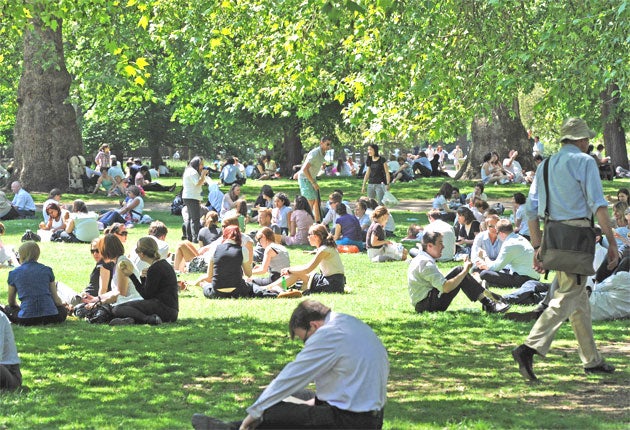Police feel the heat as crime rises along with temperatures

For most people the arrival of summer provides the perfect excuse to try to master the tricky skill of cooking on a barbecue, sunbathe in a garden they usually never use and walk shirtless in places they otherwise would not. But for the police the hot weather signals one thing: a spike in crime.
Figures released by Greater Manchester Police show that last weekend – the hottest of the year so far – the force received nearly 12,000 calls, an increase of almost 20 per cent on the previous weekend. The Metropolitan Police, who normally get 5,693 calls a day, received a total of almost 16,000 over the weekend.
Strathclyde Police also reported a rise in the number of people ringing their call centre last weekend. On Saturday they received 6,265 calls, a rise of 34 per cent on the 4,661 on Saturday 15 May, and on Sunday there were 5,709, up 38 per cent on the 4,152 received on Sunday 16 May.
The rises were attributed to the hot weather – temperatures reached 30C in some parts of the country.
Assistant Chief Constable Dave Thompson, from Greater Manchester Police, said: "Dealing with the changing weather conditions is something we work hard on. Clearly the weather can have a significant impact on the reliance on emergency services."
There are numerous theories and anecdotal evidence which suggest what types of crime increase in the summer and why. Alcohol-fuelled violence, for example, will rise because the hot weather prompts more people to go to pubs and drink. More people usually means more problems.
Burglary, too, often rises. Not only are people more likely to be out of their houses, but even if they are inside, the heat usually sees them open windows or doors, making it easier for opportunist criminals to get in.
Reports of sexual assault are also more common. With women wearing fewer clothes they can be at more risk of being groped or harassed by men who have been drinking too much.
Tourist hotspots can become crime hotspots when the sun comes out. With people flocking to one area they are prime targets for pickpockets.
Perhaps the worst example of a summer crime spike was that of teenage murders in London in 2008 when 16 young people were killed between May and September.
Barry Loveday, a criminologist from the University of Portsmouth, said: "Obviously you can't blame everything on the weather. Sometimes crimes are committed and they have nothing to do with how hot it is. But it is true that certain crimes do seem to spike during a heatwave. There was a study in France which looked at incidents of sexual attacks on children and it showed that when the weather improves there are more attacks because, quite simply, when it's hot, children are out playing and they are more vulnerable.
"I was once told by a police officer that when there is a planned demonstration or parade which they are worried might get out of hand, they pray for rain. I didn't believe it at the time, but if you think about it it makes perfect sense – fewer people are going to turn up if it is wet and that will likely make it an easier event to police.
"Similarly if you look at burglaries it makes sense that they spike in the summer and drop in the winter because burglars, like the rest of us, do not like getting wet. It is all common sense, but I don't think the public realise. They often assume that there are complex forces at work which determine when crime rises and falls, but often it is simple things like the weather."
One thing which officers fear will boost certain types of crime this summer is the World Cup, which begins next month. Pubs and parks will be full of people drinking alcohol, meaning a possible upturn in violence.
Traditionally, domestic violence also increases during the tournament, particularly on days when England are playing. A study carried out by the Association of Chief Police Officers shows that domestic violence rose by nearly 30 per cent on England match days during the 2006 competition.
But burglary is likely to drop during England matches as many criminals will prefer to watch the football.
Trouble in the sun
May Day riot
1 May 2000
Four days of peaceful anti-capitalism protests in London eventually boiled over as 1,000 people rioted, resulting in 100 arrests. Nine police officers were injured as windows were smashed and bottles, sticks, iron bars, bricks and scaffolding were thrown.
Toxteth riots
3 July 1981
Long-standing tensions between police and the local black community came to a crescendo in the July heat. The riots left 500 police officers injured as youths used petrol bombs and broken glass during nine days of violence.
Watts riots
11 August 1965
During six sweltering days in the height of the Californian summer, a mob of more than 1,000 residents of the Watts neighbourhood in South Central Los Angeles carried out a crusade of violence against Caucasian policemen, leaving 34 people dead, 2,000 injured, and 4,000 locked up.
Mosley rally
31 July 1962
Fascist leader Sir Oswald Mosley and his followers were assaulted by several thousand protesters as he tried to give a speech to his anti-Semitic Blackshirt group out of the back of a lorry in Dalston, east London. 200 police were called in to disperse the crowds.
Chicago race riot
27 July – 3 August 1919
Dozens of people died and hundreds were injured in what is considered the worst of approximately 25 racial conflict riots that took place during the Red Summer of 1919, named after the violence and fatalities across the nation.
